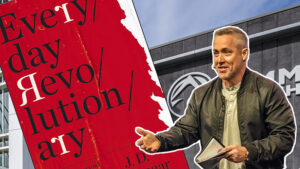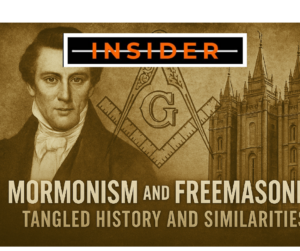JD Greear’s Neo-Clericalism and the Retreat from Public Faithfulness

When JD Greear tells pastors to “stay above the fray,” he’s not calling them to holiness. He’s calling them to silence.
In his essay, Faithfulness amid the Culture War, published at the hive of scum and villainy known as The Gospel Coalition, Greear argues that pastors occupy a different plane of responsibility than ordinary believers. The pulpit, he says, should rise above civic and political conflict to preserve gospel witness. Christians in the pews may engage, but pastors should “avoid the culture war posture” and focus instead on personal evangelism.
Coming from the former SBC president who presided over one of the denomination’s most politically charged eras, the advice rings hollow. As Protestia has documented repeatedly – whether in his embrace of “pronoun hospitality,” his equivocations on homosexuality, or his flirtation with Big Eva’s progressive drift – Greear’s ministry has long been a study in selective engagement. He confronts “tone” when conservatives speak too clearly, but retreats to “gospel priority” when the world demands clarity from him.
Now he has baptized that retreat in Reformation language. But neither Luther nor the Baptists who followed him would recognize this new clerical modesty. The Reformation was not a call for pastors to speak less, but for all believers to speak truly.
The False Dichotomy: Pastors Preach, People Engage
Greear warns that “the church’s mission is not to win culture wars but to make disciples,” cautioning that pastors must not let the pulpit become “a rallying point for one side of the political aisle.” That framing would sound like wise pastoral balance if he applied it evenly.
In the same piece, Greear acknowledges that “The Democratic Party has officially enshrined into its platform an unqualified affirmation of the murder of infants in the womb and a wholehearted embrace of gender and sexual rebellion.”
At first glance, this appears to be a rare moment of moral clarity. Yet his language (unqualified and wholehearted) reveals a deeper pattern. Greear seems to require the left’s sins to be absolute and explicit before he names them plainly. Only when rebellion becomes “unqualified” and “wholehearted” does he summon enough conviction to speak forthrightly. Anything less is treated as too complex, too political, or too secondary to the gospel to warrant public rebuke.
This rhetorical charity, however, is extended only in one direction. When the errors come from the cultural left, Greear hedges with qualifiers and pleas for nuance. When they come from the cultural right, he sheds those qualifiers altogether. As Megan Basham documented in Shepherds for Sale, Greear has repeatedly caricatured politically conservative believers as “culture warriors,” “idolaters of power,” or “Pharisees with a Fox News subscription,” and does this without any of the empathy or restraint he reserves for progressive evangelicals.
The result is not moral neutrality but selective indignation. Greear’s compassion flows toward those moving left, and his suspicion toward those holding the line. His principle of “avoiding partisanship” functions as a one-way filter: it moderates truth in one direction while amplifying critique in the other.
That’s not pastoral evenhandedness; it’s a rebranded form of clerical diplomacy. It protects credibility with the elite by disciplining only those who lack cultural power. It turns the pulpit from a place of prophetic declaration into a platform for managing perception.
The Reformers would have recognized this for what it is. Luther, Calvin, and the early Baptists didn’t demand that corruption be “unqualified” before confronting it. They understood that halfhearted error still damns whole congregations. Truth does not wait for the polls to close or the platform to harden.
Greear’s essay, therefore, doesn’t free pastors from partisanship. Instead, it institutionalizes a new kind of partisanship, one that hides behind the language of moderation. It is not the gospel that benefits from this retreat; it is the spirit of the age.
Ministerial, Not Magisterial Authority
Greear’s guiding assumption seems to be that when pastors speak forthrightly about political or moral evil, they’re overstepping their spiritual jurisdiction – as though clarity itself were a power-grab. In his model, the faithful pastor avoids any statement that could be construed as partisan and confines himself to “the gospel proper.”
But this is not Reformation theology; it’s professionalism disguised as piety.
The Reformers drew a clear line between magisterial and ministerial authority. The magisterial office (civil rule) wields coercive power; the ministerial office proclaims truth. To call sin by name is not to seize political authority but to exercise spiritual responsibility. When the pulpit goes silent under the pretext of “staying above the fray,” it ceases to be ministerial at all. It becomes managerial.
Luther called such timidity a denial of vocation: “Where the battle rages, there the loyalty of the soldier is proved.” Calvin likewise warned that ministers must not “preach a mutilated gospel” that avoids confronting the idols of their age. And in Baptist polity, the pastor’s authority has never been hierarchical but declarative—he has no sword to wield, only the Word to speak. That Word binds his conscience to public truth, not private comfort.
Greear’s approach inverts that calling. By treating boldness as a form of overreach, he recasts the pastor as a neutral moderator between competing moral visions – someone charged with maintaining tone rather than bearing witness. Yet the pulpit’s task is not to preserve appearances but to announce reality: that Christ is Lord and every false claim to authority stands under His judgment.
True pastoral humility doesn’t stay silent in controversy; it submits to the authority of Scripture even when that Word offends cultural sensibilities or institutional donors. The man who fears being mistaken for a partisan will soon cease being mistaken for a prophet.
The Biblical Pattern: Shepherds Who Speak
The notion that pastors should avoid “the fray” might appeal to modern sensibilities – but it has no precedent in Scripture. From the Old Testament prophets to the apostles of the early church, faithful shepherds have always confronted public sin and called rulers and nations to repentance.
Nathan stood before David, Amos rebuked Israel’s oppression, Isaiah condemned Judah’s idolatry, and Jeremiah decried false prophets. Their rebuke was public, political, and theological all at once—because sin never stays neatly in the private sphere.
John the Baptist lost his head for telling Herod that God’s moral law applies to kings as well as subjects. If Greear’s standard had governed John’s conscience, Herod would have kept his sin, and John his head.
The apostles were no different. When Paul reasoned “about righteousness, self-control, and the coming judgment” before Felix, he was not being partisan; he was applying divine law to public power. When he refused to mute the gospel in Ephesus, even at the cost of a riot, he proved that proclamation is inherently political because it declares Christ’s lordship over every rival claim.
Nor was Christ Himself silent about the corruption of His generation. He publicly rebuked hypocritical leaders, overturned the tables of profiteering priests, and told Pilate his authority was “given from above.” The Son of God could have remained “above the fray”; instead, He entered it, testifying to the truth.
To suggest that modern pastors must avoid cultural confrontation for fear of being “divisive” is to propose a form of ministry foreign to Scripture and unknown to church history. The shepherd who will not speak against wolves in public has misunderstood his calling.
Silence does not preserve the gospel’s purity – it leaves the field to false gospels.
Baptist Congregationalism and Public Responsibility
Baptist ecclesiology has never produced neutrality. It produces accountability. The same believers who govern their own churches also share responsibility for governing their own nation. In Scripture, civil submission is not passive; it is participatory. Romans 13 and 1 Peter 2 teach that all authority is God-given, and in a republic, that authority partly resides in the citizen himself. That means the pastor, too, stands as a citizen before God—bound by the same duty to steward his voice and his vote toward righteousness.
As I argued in Christian Nationalism Is Getting it Wrong on Jurisdiction, American pastors cannot hide behind a false sacred/secular divide. When they speak into public life, they do so as shepherds who are also stewards. Silence is not spiritual restraint; it is civic negligence. The pulpit’s job is to form consciences for participation, not to train neutrality as a virtue for pastors or pew-sitters.
Greear’s model, however, conveniently dissolves that duty. By redefining civic engagement as a layman’s domain, he creates space for pastors like himself to remain broadly and generically appealing – precisely the currency of the seeker-sensitive, megachurch ecosystem he inhabits. The “stay-above-the-fray” posture functions less as a theological principle than as a marketing strategy: minimize offense, maximize demographic reach. It is the ecclesiastical equivalent of brand management, where ambiguity becomes a form of “evangelism.”
This impulse is not unique to Greear; it is the institutional temperament of The Gospel Coalition itself. What began as an effort to defend gospel centrality has hardened into an ethos of toothless cultural winsomeness – a posture that prizes civility over clarity and influence over integrity. Within that framework, Greear’s version of pastoral restraint fits perfectly: it frees platformed pastors from the burdens of conviction while preserving their access to polite society.
But Baptist polity was never designed to produce celebrity diplomats; it was meant to produce courageous congregations. The pastor’s calling is not to make himself broadly palatable but to make the truth publicly visible. His authority is ministerial, not managerial; he speaks for Christ, not for his brand.
And when that calling is abandoned, the results are predictable. The same false pulpit/pew divide that shields megachurch leaders from controversy can also weaponize their authority against ordinary believers who take public conviction seriously. The recent case of Texas business owner Daniel Keene, reportedly disciplined by his elders for outspoken political opinions, shows where this trajectory leads. When pastors imagine themselves as custodians of “respectable Christianity,” they inevitably begin disciplining the courageous instead of confronting the corrupt.
True Baptist congregationalism leaves no room for that hypocrisy. The pastor stands beside his people as a fellow citizen under God’s authority, equipping them to engage a fallen world – not apologizing for them when they do. A pulpit that refuses to speak clearly cannot train a pew that will live faithfully.
The Cost of Silence
The most dangerous thing about Greear’s argument is its trajectory. Once pastors redefine public clarity as “partisanship” and civic engagement as “distraction,” silence becomes sanctified. The pulpit turns from a platform of truth into a podium of caution. Pastoral restraint soon becomes pastoral retreat, and retreat becomes policy.
That posture carries a heavy cost. When pulpits go quiet on public sin, the culture catechizes the church. The sheep are still being discipled, but it’s not by their shepherds. The vacuum left by muted pastors is quickly filled by secular priests: influencers, politicians, and pundits who are more than willing to define righteousness and compassion on the church’s behalf.
History offers its verdict. Every time the church has traded courage for credibility, it has lost both. The German pastors who stayed “above the fray” during the 1930s believed they were preserving the gospel’s witness; they ended up discrediting it. The American pulpits that avoided slavery for fear of “politicizing” the gospel protected their institutions but forfeited their integrity. The temptation to neutrality always dresses itself as prudence, when in reality, it’s a fear of man disguised as wisdom.
In our own day, Greear’s version of neutrality serves the same function. It grants cultural and institutional permission to avoid confrontation while posturing as gospel purity. But the gospel needs no such protection. Truth is never endangered by clarity; it is endangered by compromise.
Baptist pastors, in particular, should recognize the irony. The same tradition that birthed congregational liberty and the priesthood of all believers is now being counseled to withdraw from the very public square it helped create. The early Baptists were jailed and fined not for staying above the fray but for preaching Christ’s Lordship into every fray imaginable. They believed, as Luther did, that silence in the face of evil is itself evil.
The cost of Greear’s vision is profoundly pastoral. A pulpit that will not speak cannot equip its people to live. A shepherd who avoids controversy to protect his platform leaves his flock vulnerable to wolves that do not share his scruples. And a church that values winsomeness over witness will soon learn that the world always collects on its debts of relevance.
True faithfulness is not measured by tone or by reach but by truth. The Reformation was not a call for ministers to become more cautious; it was a call for them to become men again, speaking, standing, and bearing reproach for the sake of conscience.
The American pastor does not need less conviction in the public square; he needs more. He is a preacher and a citizen, a servant of Christ and a steward of the common good. His silence can only be considered surrender. And as the culture grows darker, this silence will not be remembered as prudence. It will be remembered as betrayal.
Faithfulness Is Not Flight
JD Greear’s “faithfulness amid the culture war” isn’t faithfulness at all. Rather, it’s a flight to higher ground that simply doesn’t exist. The gospel is not endangered by pastors who speak plainly about sin, but by pastors who refuse to. The call to shepherd God’s people is not a summons to public neutrality but to public truth. To preach “Christ is Lord” is already a political act; to remain silent about what that Lordship requires is to deny its scope.
The Reformation reclaimed the pulpit from priests who claimed to mediate God to man. Today it must be reclaimed again from the professionals who pretend that silence is sanctification. The church does not need more men who know how to stay above the fray. It needs men who know how to stand in it, Bible in hand, without apology. This is real pastoral courage. And Greear and his ilk want no part of it.







Remote work isn’t just a trend, it’s the future of work. qs Work Remotely from your own house. We just want your typing skills, You can make more than 130USD/Hr. No matter where you are. Let’s Grow together and do great things, even if we’re far apart…
Take a Look……… https://Www.EarnApp1.Com
Remote work isn’t just a trend, it’s the future of work. qs Work Remotely from your own house. We just want your typing skills, You can make more than 130USD/Hr. No matter where you are. Let’s Grow together and do great things, even if we’re far apart…
Take a Look……… https://Www.EarnApp1.Com
Remote work isn’t just a trend, it’s the future of work. (z11) Work Remotely from your own house. We just want your typing skills, You can make more than 130USD/Hr. No matter where you are. Let’s Grow together and do great things, even if we’re far apart…
Take a Look……… https://Www.Paycash1.site
Remote work isn’t just a trend, it’s the future of work. qs Work Remotely from your own house. We just want your typing skills, You can make morey than 130USD/Hr. No matter where you are. Let’s Grow together and do great things, even if we’re far apart…
Take a Look……… https://Www.EarnApp1.Com
Well said, brother. Man, I wish I had your gift of writing! Blessings
Its simpler than this. These wishy washy pastors are just LEFTISTS. All the pretend 3rd wayism and middle of the road milktoastism is just that they are LEFTIST and think we are like stupid boomers who can’t see through this false nose. Younger generations don’t fall for this crap.